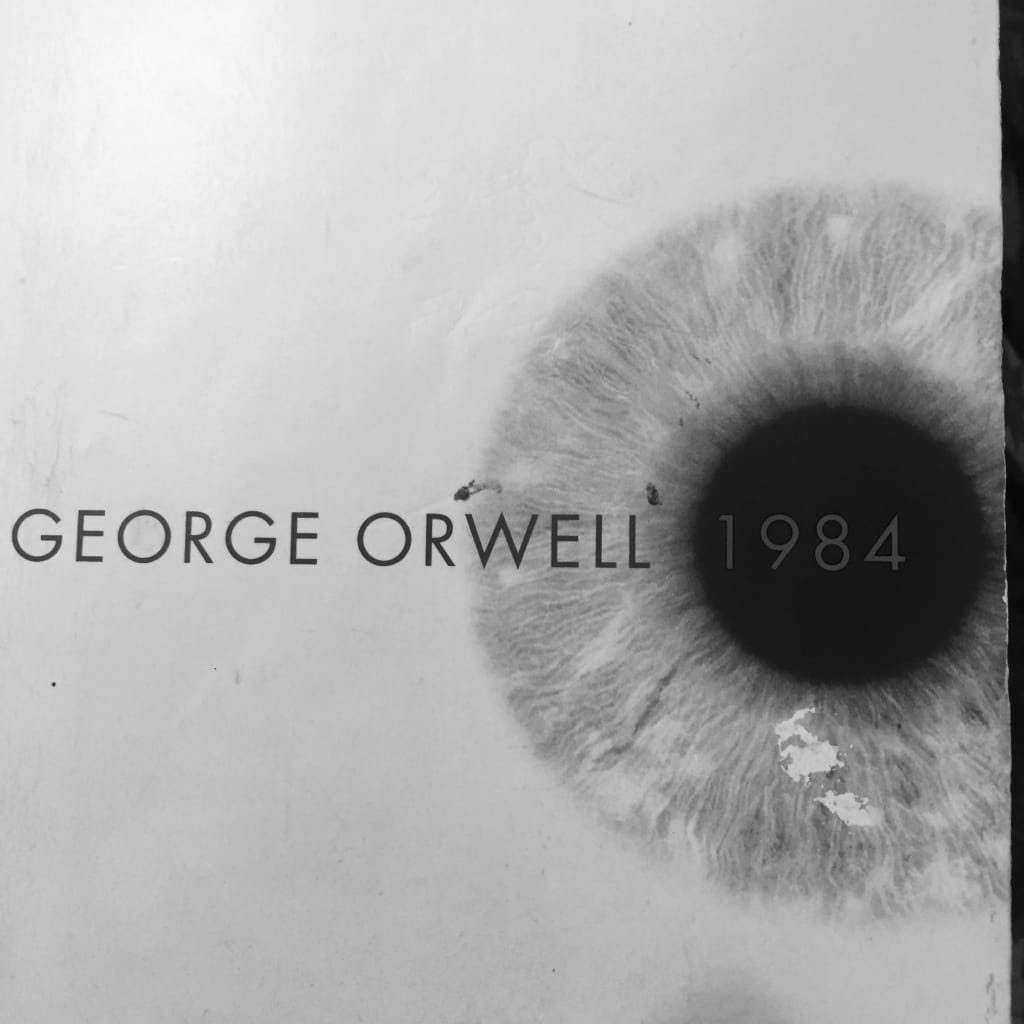Ignorance in the Theology of Oceania
'1984' Orwell

A person whose mind is restricted and trained to believe one idea and one idea only can never truly be free. The idea that a controlled population is a free population is flawed. The very essence of freedom is knowledge. When a government puts regulations on free knowledge or restricts individuality, the government regulates development; intellectual as well a secular. In George Orwell's 1984, Winston Smith is a man living in a dystopic reality with nothing but control all around. Winston quickly discovers that Big Brother will not tolerate free thought or free will. It is irrational to think that total control is for the good of everyone, and Orwell's 1984 warns of giving into that total control, whether to a government or other powerful group. 1984 uses the theme of orthodoxy that parallels to religious ideals of supreme beings, blind faith, and unwavering allegiance to warn of the dangers of the idea from the novel that "ignorance is strength."
First, religion can be a difficult idea to define. Most definitions tend to be too inclusive or too exclusive when defining religion. For example, any definition of religion that includes “God” will exclude most forms of Buddhism. Inversely, many definitions of religion that are described as the function of a group may be so inclusive and broad that by definition they include groups like crowds at football games or rock concerts as “religion.” A general working definition for religion could be: a collective social and moral establishment enabling people to find meaning in life (David V. Barrett).
Religion is inert. The need to find meaning in life and worship something is programmed in humans on a very primal level (Barrett). The powers of Oceania know this, and the Party uses this primal urge to their full advantage. Not only is the need to worship almost universally felt, but many religions restrict this worship to one very specific being. Almost all religions of the world hold their beliefs in some sort of book or collection of teachings, passed down by generations. These holy books, or beliefs, are generally described as constructed by God and as such are absolute in both truth and moral. For believers, “there is broad consensus that sacred revealed scripture contains and communicates comprehensive and complete truth for all humanity forever,” so any suggestion outside of this simply cannot be true (Clarke, Vollebaek, Agoy, Elsanousi, 2017, p.97). In Christianity, this is the Bible; and in Islam, it is the Qur’an. In Christianity, the idea that “Thou shalt have no other Gods before me,” bounds believers to this one god with implied judgement if a person were to stray from them (King James Version Bible, Exod. 20.3). Much like Christians, Muslims are constricted to believing in one absolute authority in the first pillar of Islam. This fundamental pillar of Islamic faith states that nothing except for their one God is deserving of worship (The Qur’an. Trans. Talal Itani 3.18). Orwell parallels this idea of a single omniscient force in Oceania with the all-powerful Big Brother. Just like other monotheistic religions, the Party members of Oceania are required to pay homage to Big Brother and nothing else. There are also underlying fears of betrayal of this “worship” of Big Brother, when ones who go astray disappear in the night and are never heard from again (George Orwell 45).
Omnipresence is a powerful fear tactic that presents itself in real world religion, as well as in Oceania. The idea that God or some other supernatural being is always watching tends to keep the masses in check for fear of some kind of punishment. In many monotheistic religions, the ultimate punishment for going astray is some sort of eternal hell. In Oceania, the Party uses the phrase “Big Brother is watching you” to instill this same idea of fear and the punishment for going against the Party is death (Orwell 2). The idea that someone with this much power and authority is watching a person’s every move and thought is enough to keep even the most rambunctious tendencies at bay. This holds true as long as this supreme being has been afforded the right amount of power and sovereignty. This is the whole point of a supreme being to keep all believers in order and give strength to those in power. Of course, neither real world religions nor the Party in Oceania describe this obedience as fear; rather, they describe it as love. To be a truly functional member of the Party, one must love Big Brother as Winston comes to love Big Brother with everything he has at the close of 1984 (Orwell 298). In Christianity, Christians are commanded to love God with all their heart, soul, mind, and strength (Mark 12:30). The use of this tactic benefits only the ones holding power. The masses are taught to be obedient to an all-knowing deity and to love that fact. However, true happiness and prosperity comes from individuality. A person cannot be an individual while adhering to the commands of an immaterial power. Control over one’s self is power and strength.
Furthermore, Party members in Oceania follow orders and codes passed down from Big Brother blindly. This is also true in many forms of religion. People tend to trust the word of authorities without a second guess. Party members toil away at jobs in the ministries rewriting history every day and somehow have faith that what they are doing is right and good based off of what they are told and what others are doing. Winston adjusts figures and rewrites articles daily that change recorded history (Orwell 40). Winston is fairly unique in the fact that he realizes that what he is doing is just substituting one "fantasy" for another when he does his rectifications (Orwell 41). Most people in religious faith, or in Oceania, take "facts" or "truths" that are passed down from a supreme being as absolute, and don't question the validity whatsoever. The fact that God or Big Brother commands it is enough to have faith that it’s correct.
This blindness can cause people to do things a person would not normally do. To test the faith of one of his followers, God commanded Abraham to sacrifice his only son. Abraham did not waver and set out to kill his son. God intervened and stopped Abraham before the murder, believing Abraham had proven his faith (Gen. 22. 2-18). Abraham was willing to kill his own son just to appease his God. The idea that a person would do this just for a chance to go to heaven is frightening. A similar situation occurs in 1984 when Winston's neighbor, Parsons, is turned in to the thought police by his own daughter (Orwell 233). Parsons is proud that his daughter did this. His daughter is only seven and knows nothing of the meaning of thoughtcrime, other than that she is taught at school to turn people in if it occurs. This emphasizes the faith Party members have in Big Brother and the Party itself to allow children to be programed in a way that they can’t even think for themselves. To think for oneself is threatening to the Party; it is strength and hope, therefore it is dangerous.
To know something is wrong while still holding to the idea that it is also right goes against human nature. "The term doublethink means the power of holding two contradictory beliefs in one's mind simultaneously and accepting both of them," (Orwell 214). Doublethink is a powerful tool for a group in power, especially when the masses already blindly follow. Plato posed a question that relates to the logic of following orders passed down by an omniscient power. This question may need the idea of doublethink to grasp the blind faith it may imply. Helm states, "suppose that morality is commanded by God, do we follow the command because it was commanded by God and it is therefore good and true, or rather is the command already good and true, which is why God commanded it.” Blind faith leads Party members to believe that the only requirement for truth is that the Party and/or Big Brother command it. This is a fundamental issue in that, if coercion is involved, how is one to know they are blindly following false information? When one does nothing for one’s self, real "truths" may be over looked, or passed over entirely.
Aside from the ignorance of blind faith in an omnipresent being, the unwavering allegiance exhibited by Party members in Oceania is also troubling. This obedience to God is communicated through the teaching that the only way to get to Heaven is through him. He is "The way, the truth and the life" (John 14.6). This unwavering dedication presents itself in the pillars of Islam, as well. Muslims are required to pray five times a day to show their convictions to God (The Qur’an 11.114, 17.78). Winston and other party members are required to participate in the two minutes hate every day. This ritual brings everyone together for a session of yelling and screaming about what is portrayed as bad just so Big Brother can save the day and strengthen the faith and allegiance the Party members have toward him.
Karl Marx has described religion as "the opiate of the people" (Barrett). People need religion just like they need a drug. Faithfulness to the extreme is hard to blame on the person; however, evil acts perpetrated with righteous intentions are still evil. Gathering "criminals" together for mass execution just because their thoughts do not align with those of the party, as in the "special showpieces," demonstrates to the masses what will happen if they step out of line, even in their thoughts (Orwell 44-45). These thought criminals do not threaten other Party members; thought criminals only threaten Big Brother. For fear of being executed, Party members will be loyal to a fault and never think twice about it. Abdulaziz Sachedina states that "God transcends the order of nature. Hence, the notion of freewill is incompatible with the divine transcendence.” As long as there is a divine entity in power, free will cannot exist.
Unwavering allegiance can cause "radically" religious groups to wage war and order killings to be carried out by followers to meet the need of the group in power. The soldiers of Oceania fight never ending wars with East Asia and Eurasia just so that the Party can use up all the goods produced and keep Oceania in the state of poverty they are in (Orwell 191). Religious leaders do the same as they push their own agendas through the believers that follow their cause. According to Richard Langhorne Routledge, "Religions often given holy meanings to essentially secular agendas" that have nothing to do with the doctrines in the religion. Some leaders can render something as “holy” to create a passion in the masses to believe in it. In Oceania, everything good has come from the leadership of Big Brother; therefore, everything commanded by Big Brother is inherently "good" aside from any personal morals. Personal morals and beliefs have no place in Oceania, only the belief in Big Brother.
Ultimately, Orwell parallels horrors in 1984 to extreme instances of real world issues. It is dangerous to overlook the potential risks of orthodox ideas like supreme beings, blind faith, and unwavering allegiances. To restrict the human mind is to restrict growth and development, not only of the individual, but of the world as a whole. 1984 demonstrates what may happen if atrocities of control are allowed to go on without resistance. Ignorance is an enemy that cannot be defeated once it has taken control. When history is controlled, how can people learn from it? Knowledge comes from history. Strength comes from individuals, ideas, and unity. Ignorance is not strength. It would be ignorant to let Orwell’s warning go unheeded.






Comments
There are no comments for this story
Be the first to respond and start the conversation.